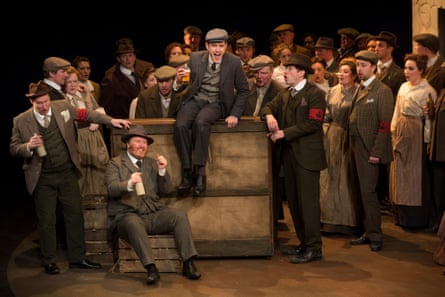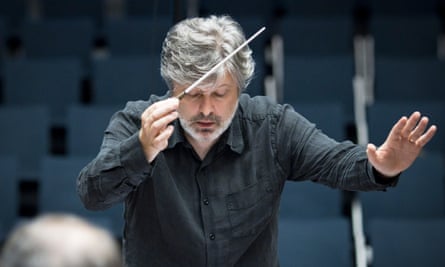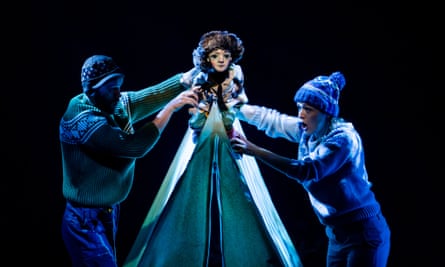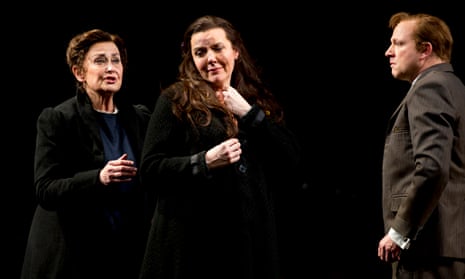A black tale of infanticide and failed intention, Janácek’s first mature opera, Jenufa (1904), has always seemed locked fast in its 19th-century Moravian village location. To swap a Czech folk setting for whitewashed stone, slate roof and the Irish conscription crisis of 1918 might sound effortful at best, at worst tiresome.
This was Annilese Miskimmon’s solution, lightly handled, for her new staging for Scottish Opera, a co-production with Danish National Opera. It proved as natural as crossing a room and looking out of another window. The landscape is the same, the perspective different and unexpected.
The common ground is rural poverty, the mores of the Catholic church and old misogynist notions of superstition and witchery. A stepmother, the Kostelnicka (Kathryn Harries), is convinced that her daughter Jenufa (Lee Bisset), pregnant out of wedlock, will be condemned to a life of shame. To save her, the Kostelnicka commits a murder and has to carry her own far greater burden of infamy.
The removal of the story to the west of Ireland quietly underlines the priggish atmosphere of a tiny community accustomed to judging wrongdoings in the name of religion. All that’s missing is a parish priest. Disobligingly, Janácek does not provide us with one. Yet his spirit is there. Think of the antecedents to the characters in Colm Tóibín’s novels and you catch the mood.
There are no winners. The women are powerful but oppressed, the men fickle or crass. When one, Laca, turns out to be faithful in love, the curtain falls before his fidelity is tested. In the closing moments, after some two hours of urgent, clotted harmonies and jostling, gravelly outbursts, Janácek’s music switches to radiant optimism. We hang on to the fragility of that hope.
Bisset, herself five months pregnant and putting body and soul into her performance, has a generous, pliant voice and an ability to play high drama with cool naturalism. She showed her character’s confusion, pain, resignation and acceptance without ever overstating. Harries, a seasoned Kostelnicka, has less vocal bloom than once, but the mix of icy rectitude, sympathy and despair was superbly expressed. Sam Furness and Peter Wedd as the half-brothers Steva and Laca nimbly convey the one’s careless arrogance, the other’s hopeless, angry infatuation. Furness has a still youthful, bright sound, while Wedd’s voice is bigger and more tonally varied. The combination worked. From the highly experienced Anne-Marie Owens to one of the company’s emerging artists, Rosalind Coad, this was a strong cast.

The orchestra of Scottish Opera made a powerful case for this score, which hurtles along, brittle, agitated, as if friable. Flute, harp, cor anglais, xylophone, contra bassoon: each, expertly played, offers a spare, intense contribution. Stuart Stratford conjured a white-hot performance, after an uneasy start. An unavoidable 45-minute delay to the performance due to a medical emergency must have put everyone on edge. An Opera Holland Park discovery, Stratford will conduct Il trittico there this season. Scottish Opera, currently seeking a new music director, should snap him up.
Adroitly designed by Nicky Shaw with lighting by Mark Jonathan, the work opens in the confined yard outside a small stone house, the Kostelnicka’s. This plain exterior is later reversed to reveal a detailed interior: scrubbed wooden table, dresser with plates, copper pans, candles and objects of faith, notably a crucifix. As the curtain rose, someone behind whispered “Polly Pocket”, but this doll’s house was life-sized. So too was the impact and intelligence of this production.
Some of the cast had performed in a recent new production by Scottish Opera of James MacMillan’s Inés de Castro, a work which also features infanticide. (Opera is not short of them. I feel a list coming on.) The Glasgow-based MacMillan (b1959) had gone south for Easter to conduct two performances of his St Luke Passion, first at King’s College, Cambridge (relayed live on Radio 3), then for its London premiere at the Barbican. One of the work’s co-commissioners, the Britten Sinfonia and Britten Sinfonia Voices, performed it with the boys of the Schola Cantorum of the Cardinal Vaughan memorial school and Trinity Boys Choir, London, who together took the role of Christus.

Smaller in scale than MacMillan’s St John Passion (2007), the St Luke (2012-13) emphasises the drama of the Passion story, violent and all too human, using choral voices and no soloists. The orchestra is moderate in size but enormous in effect, especially in the ferocious pairing of timpani and brass. Organ and low strings are used much as a baroque continuo, supporting and elaborating. In a tumultuous eruption near the end, the tune of a Bach chorale is heard, broken and eclipsed, as if through a time machine. A long solo violin passage (beautifully played by Thomas Gould) eases the work to a mystical, serene conclusion. Boys and adult choirs were outstanding, so too the Britten Sinfonia. A disc of the work has already been released (by the Dutch forces who gave the world premiere). One or two fearless amateur choirs have already signed up to perform the work next season. MacMillan’s singular, potent mix of tradition and novelty has earned its following.
In Swanhunter by Jonathan Dove (also born in 1959) we enter a magic world of witches, mothers and, in this production by Hannah Mulder, tents that double as mountains and campers who are as deft with puppets as with billycans. This family opera, new in 2009 with a libretto by Alasdair Middleton, is enjoying a new staging with ingenious theatrical economy by Opera North and the Wrong Crowd, at the Linbury Studio then on tour. Featuring the legendary Finnish hero Lemminkäinen (Adrian Dwyer) from the Kalevala that also inspired Sibelius, Dove and Middleton tell a simple story with enough blood, gore and mystery to hold a young-and-old audience captive – certainly at the Bank Holiday matinee.

Scored for six instruments, accordion, violin and harp dominate, with funky drum kit, smoochy double bass and a young-Siegfried style whooping horn (it’s all quite Wagnerian sans incest) to provide an astonishing array of orchestral colour: part Baltic folk, part jazz, a bit of Stravinsky all rolled into Dove at his most skilful. The six singers, doubling as puppeteers, and six instrumentalists, conducted by Justin Doyle, dazzled.
Lusty Lemmo strides in, wearing coonskin cap, crossbow at the ready, and announces: “Mother, it’s time I found a wife.” He heads north – good bride territory – and has to confront an elk, a glittering devil’s horse and a gorgeously lyrical, coloratura swan (Suzanne Shakespeare). Unfortunately Death mauls him to pieces. Oh no! Luckily, his mother sings him back to life. Oh yes! Forget the wife – Lemminkäinen goes back to mum and that’s the end. No wonder so many adult children are still living at home. I have always had a resistance to elks, but this opera was a total charmer.
Jenufa transfers to the Festival theatre, Edinburgh, 16-18 April
Star ratings (out of 5)
Jenufa ****
St Luke Passion ****
Swanhunter ****

Comments (…)
Sign in or create your Guardian account to join the discussion